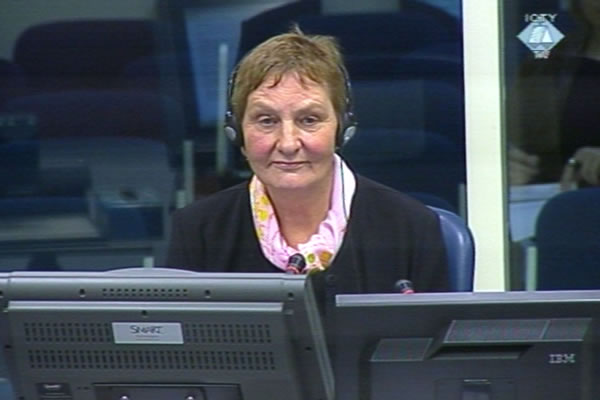Home
WITNESS OF MADNESS IN BILJANI
As the prosecution continues its case at the trial of Ratko Mladic, former Danish interior minister Bertie Weiss started her evidence. In 1996, Weiss was present at an exhumation of Muslims killed in the village of Biljani near Kljuc in July 1992
 Bertie Weiss, witness at the Ratko Mladic trial
Bertie Weiss, witness at the Ratko Mladic trial Former Danish interior minister Bertie Weiss gave evidence at the trial of Ratko Mladic. In 1996, Weiss attended an exhumation and identification of Muslims executed on 10 July 1992 in the village of Biljani near Kljuc. The indictment alleges that 144 Muslim men were killed that day.
On 8 November 1996, Bertie attended ‘as an impartial witness’ an exhumation of the men who had been executed and whose bodies were found in a mass grave Bezdana at Laniste. She was also present when the victims were identified in the school gym in Biljani. Both events were videotaped and the prosecution showed the footage in court today. The footage was admitted into evidence in the case against Mladic.
‘It was clear that it was massacre; in the aftermath, the men were simply thrown into a pit which was about 20 meters deep’, the witness said watching the video of the exhumation. The event moved the witness to examine the incident in Biljani more closely and to explore why villagers of Kljuc and other places in Bosanska Krajina were forced to leave their homes. After three years of research, the witness published her findings in a 1999 book entitled Witness of Madness.
Following up on the information and documents she got in the police station in Kljuc, the witness found and interviewed Marko Samardzija, a local teacher, an ethnic Serb. In the interview, shown in court today, Samardzija told the witness that the plan had been to send the most extreme Muslim detainees to Manjaca. There were 14 such prisoners, Samardzija said while others, in his view, should have been left alone. According to Samardzija, the extremists were ‘the people who represented danger to the Serb population’: young men whose families ‘sullied their hands’ in 1991.
Samardzija told the witness that he ‘learned about all those terrible things later’. In his conversation with the witness, Samardzija confirmed that he had spoken about the crime with several persons who were in command in Biljani.
In the cross-examination, Mladic’s defense counsel Branko Lukic tried to prove that the crime in the village of Biljani was an act of revenge. According to Lukic, the police, not the army, secured the prisoners. In the interview with Samardzija, the witness got the impression that he was vengeful and that it might have been what motivated the others. Asked if ‘only the police’ guarded the prisoners in Biljani, the witness said she couldn’t answer.
The prosecution will resume its case at the trial of Ratko Mladic on Monday, 19 November 2012.
Linked Reports
- Case : Mladic
- 2012-11-15 MLADIC ‘DOMINANT PERSONALITY’ IN THE VRS
- 2012-11-12 DEFENSE: TRAM HIT BY STRAY BULLET
- 2012-11-09 ‘BLOODY ADMISSION SYSTEM’ IN OMARSKA
- 2012-11-20 FORMER PRISONER IN KPD FOCA GIVES EVIDENCE
- 2012-11-21 THE DAY FIRE RAINED ON SARAJEVO: 3,777 SHELLS IN 12 HOURS
- 2012-11-22 ‘ADJUSTING’ MORTAR FIRE
